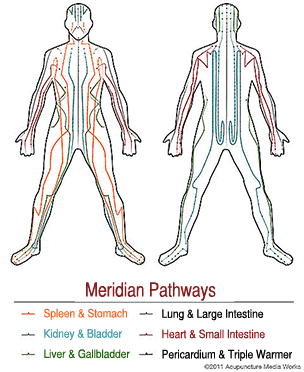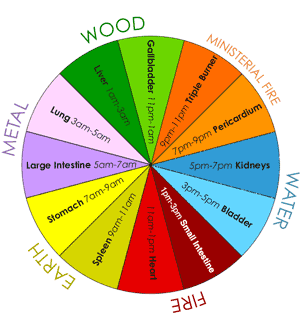
sponsor: Qi Journal
Navigation:
Portals
|
article: What is Qi? | author: Emma Suttie, D.Ac, AP | date: 2016-02-18 08:24:52
|
|
What is Qi?

The body's 12 main meridians. Qi is a huge and complex subject, and one that is central to Chinese medicine theory. Qi is a difficult concept to explain because it is difficult to measure, and impossible to see. To the Chinese, it is a given. It is the very force that governs life and all of its processes, but for us in the West, it is a little more difficult to wrap our minds around. In the West, we live in a culture that is largely ruled by science, and science is all about things that we can see and prove. Although science is now able to prove the efficacy of things like acupuncture, the HOW is still largely under debate. Qi is at the core of why all of the modalities in Chinese medicine – Acupuncture, Chinese herbs, gua sha, tuina, moxibustion, cupping, auricular, it is one of the main reasons that they are so effective, and have been for more than 5000 years. 
The organs and corresponding times. Qi is a subtle energy that can be loosely translated as vital energy or life force. In India it is called Prana. In Japan, Ki. Many of the Eastern cultures know and understand this concept and its role in keeping the body healthy. In Chinese medicine, Qi is the force that animates all living things. Qi flows through energy pathways throughout the body called meridians or channels. There are 12 main meridians that correspond to specific organs and run bilaterally, mirroring each other. There are also extra pathways that run deeper in the body, but all are the channels through which Qi travels. Qi must move freely throughout the body for health to be maintained. A blockage of the Qi in the body usually results in pain (a main symptom of Qi stagnation) and if left untreated can cause a whole host of other, more serious problems. In addition to Qi running through the meridians, each organ also has its own unique Qi. Each organs’ Qi can become deficient, excess, or stuck, or stagnated. A stagnation of Qi starts energetically, but if left untreated, can manifest physically as things like tumors and other masses. This is why it is important to keep Qi flowing freely. The Qi in the body also flows in two hour intervals through each of the organ systems. This is used as a diagnostic tool by TCM (traditional Chinese medicine) practitioners. If, for example, you are waking up consistently at a specific hour every night, it points to an imbalance in that specific organ. If there is a certain hour of the day when you feel particularly productive, then it would suggest that the organ that corresponds to that hour is strong. You can see the chart for the organs and the corresponding times. Because of the importance of Qi and its ability to flow freely through the body, the Chinese have developed many exercises to help build Qi, as well as keep it moving freely. The external martial arts, like Kung Fu are excellent for cultivating Qi and keeping it moving, and the internal martial arts like Tai Chi and Qi Gong are excellent ways of cultivating and strengthening Qi and keeping it flowing throughout the body so that health can be maintained. There are many ways to build Qi. Good food, clean air, and participating in positive activities all build Qi. And many things diminish Qi, like stress, not getting enough sleep and having an unhealthy lifestyle. It is almost impossible to stay away from stress and other things that can deplete Qi, but the good news is that we are always able to rebuild it by simply doing things that give us energy. Keeping Qi moving is extremely important and the best way to do this is simply by moving your body. The act of walking (preferably in nature) is a wonderful way to keep Qi moving and stay a healthy, happy human being. Endnotes:This entry originally appeared on Emma Suttie's web site, Chinese Medicine Living: Traditional Wisdom for Modern Living. See http://www.chinesemedicineliving.com. Slight changes were made to fit the stylistic requirements of Qi Encyclopedia. |
